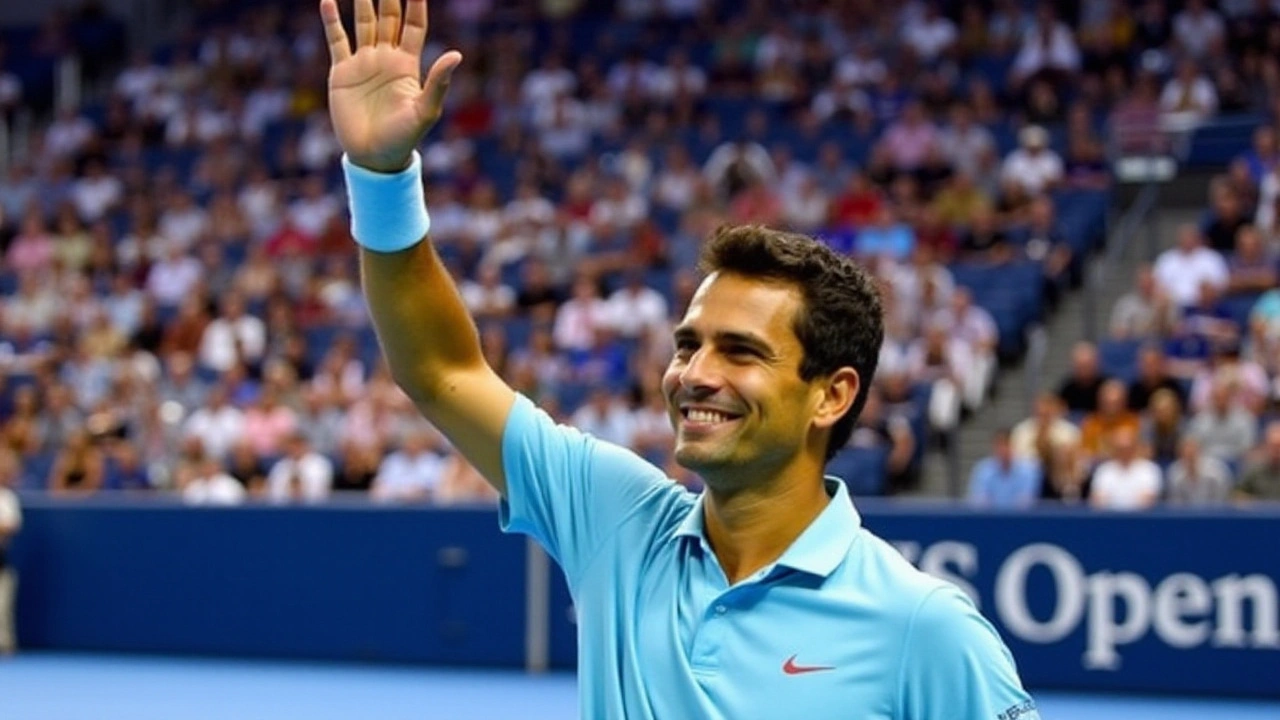Carlos Alcaraz Reflects on Surprising US Open Defeat
Carlos Alcaraz, a name synonymous with exceptional talent and dedication in tennis, faced an unexpected and early exit from the US Open this year. His match against Botic van de Zandschulp, which resulted in a second-round defeat, left fans and analysts alike in a state of shock. Alcaraz, who has always been candid about his journey, didn't hold back when discussing the reasons behind this surprising turn of events.
The Mental Battle on the Court
In the post-match interview, Alcaraz spoke openly about his mental state during the match. For him, it wasn't just the physical aspect of the game that was challenging, but a mental struggle that he described as 'a fight against myself.' Throughout the match, cameras caught him pointing to his head frequently, a clear indication that his mental game wasn't at its peak. This vulnerability and honesty about his mental health shed light on the often-overlooked psychological aspects of professional sports.
Alcaraz admitted to feeling emotionally drained and mentally backward after a grueling summer. The season had been filled with highs, such as winning titles at Roland Garros and Wimbledon, and grueling lows, including his participation in the Paris Olympics. This relentless schedule had taken a toll on him, leading to moments of disconnection and emotional upheaval, which ultimately affected his performance at the US Open.
The Opponent's Performance
While Alcaraz struggled to maintain his usual form, Botic van de Zandschulp seized the opportunity to play exceptional tennis. Alcaraz was quick to praise van de Zandschulp, acknowledging that he played 'really good tennis' and didn't commit the errors that Alcaraz had anticipated. The statistics were telling: Alcaraz managed only 21 winners compared to 27 unforced errors. This stark contrast highlighted his struggles with consistency throughout the match, a struggle deeply intertwined with his mental state.
A Season of Highs and Lows
Reflecting on his 2024 Grand Slam season, Alcaraz had plenty of reasons to be proud despite the early exit at the US Open. His journey this year included a quarter-final run at the Australian Open, incredible victories at Roland Garros and Wimbledon, and valuable experiences from the Paris Olympics. However, the demanding schedule and the relentless pressure clearly contributed to his mental and emotional strain, affecting his performance in New York.
Moving Forward: Addressing Mental Resilience
One of the crucial takeaways from Alcaraz's reflection was the need to enhance his mental resilience and control, especially when confronted with issues on the court. The young tennis star emphasized the importance of better managing his mental state to ensure consistent performance during matches. He also recognized the value of discussing these challenges with his team to develop strategies for better handling such situations in the future.
Alcaraz's story is a poignant reminder that athletes, regardless of their skill and achievements, are not immune to mental struggles. His candidness about his emotional and psychological state brings much-needed attention to the importance of mental well-being in sports. As he navigates through this phase, the tennis community and his fans stand in solidarity, hoping to see him return stronger mentally and physically.
The Importance of Mental Health in Professional Sports
Carlos Alcaraz's experience underscores a critical point: mental health in professional sports is just as important as physical fitness. The pressure to constantly perform, coupled with demanding schedules and the high stakes of competition, can significantly impact athletes' mental and emotional well-being. Alcaraz's willingness to speak openly about his struggles serves as an inspiration to many, promoting a culture of honesty and support around mental health in sports.
As Alcaraz prepares for the next phase of his career, the lessons learned from this experience will undoubtedly play a crucial role in shaping his approach to future matches. The tennis world eagerly anticipates his return, hopeful that he will come back stronger and more resilient. His story is not just about a single match or a season but a testament to the enduring spirit of athletes who overcome challenges both on and off the court. Carlos Alcaraz's journey continues, with the promise of more remarkable achievements and a deeper understanding of the importance of mental resilience in sports.


mahak bansal
August 31, 2024 AT 12:53He's not broken. He's just human.
Lewis Hardy
August 31, 2024 AT 14:10Prakash.s Peter
September 1, 2024 AT 00:44ria ariyani
September 1, 2024 AT 18:17Emily Nguyen
September 2, 2024 AT 10:45Ruben Figueroa
September 3, 2024 AT 05:00Bro got 27 unforced errors and still thinks it's 'mental'?? Bro, you missed 3 easy volleys. That's not trauma. That's poor technique. Maybe try practicing instead of therapy?
Gabriel Clark
September 3, 2024 AT 23:48Elizabeth Price
September 4, 2024 AT 22:57Steve Cox
September 6, 2024 AT 14:33Aaron Leclaire
September 7, 2024 AT 11:52Mitch Roberts
September 7, 2024 AT 17:09Alcaraz-you’re not alone. We see you. We got you.
Mark Venema
September 8, 2024 AT 19:54Jasvir Singh
September 8, 2024 AT 23:43Brian Walko
September 10, 2024 AT 09:10